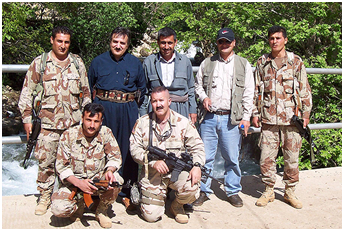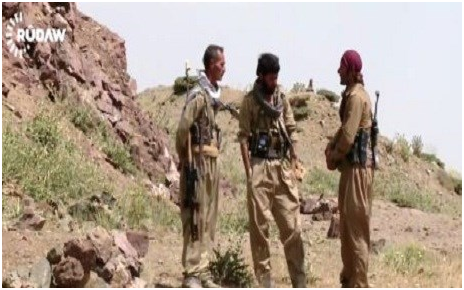Iranian Kurdish Resistance: A Key U.S. Ally in the War against the Islamic State
After the Sunday, December 20, 2015 Lisa Benson show, we caught up with US Army Brig. Gen. (ret.) Ernie Audino. See our December 2015 NER Interview with him, “No War Against ISIS Without the Kurds”. There was a swirl of rumors and a buzz in the parliament of the Kurdish Regional Government in Erbil about the alleged death of Islamic State self-styled Caliph, Abu Bakr al-Baghdadi at the hands of Peshmerga, the alleged death of Quds Force commander, Gen. Soliemani and Ayatollah Khamenei on his death bed. To which Audino said, this has to be confirmed. We would add in Hebrew, Alevai,” it should only be.”

US Army Brig. Gen. (ret.) Ernie Audino, kneeling center with Kurdish Peshmerga.
Audino, steadfast American supporter of the Kurds and various peshmerga forces in the KRG , adjacent Syria and Iran was in the process of finishing a Washington Times (WT) column on why the Kurds have Christmas trees.
However, of more compelling interest was the Tehran push-back against his previous WT column , last Tuesday, December 15, 2015, “Friends of US in Iran. ” Audino’s tag line was “Sons of the Kurdish Republic are ready to fight Islamic terrorism.”It was about arming the three Iranian Kurdish resistance groups in northwest Iran that continue to bedevil the Islamic Regime in Tehran. This despite the fall of the short-lived Kurdish Republic, formed with support of the then Soviet Union in 1946. It was headed by its President Qazi Muhammad, who was captured by Iranian troops, tried for treason and hanged by the last Shah of Iran in March 1947. Audino wrote:
“If the [Tehran] regime had more to worry about internally, it would have less appetite for external adventures,” said a senior source in one of the three major Kurdish opposition groups active in Iran and looking to the West for aid. He makes an important point — much of the Sunni-Arab support for the Islamic State, or ISIS, is motivated by the threat of an increasing, Iranian-Shia influence in Iraq, Syria, Yemen and portions of Saudi Arabia.
“Tehran has feared no international sanction,” the same source added, “That is why it felt free to violently crush the weeks-long demonstration in the city of Mahabad in May.” Those protests erupted in the Kurdish-populated city in northwestern Iran after a young, Kurdish woman leapt to her death while reportedly trying to escape an attempted rape by an Iranian intelligence officer. “And if we look back to the popular demonstrations in Tehran in 2009,” he continued, “they had potential to ignite a Persian Spring, but no one assisted them. The USA looked the other way while Tehran attacked protesters and shut down the social media the crowds were using to coordinate their actions.”
Still, the members of his group and those of the other two groups keep alive the famed, blood-deep, Kurdish refusal to submit. Case in point; the Kurdistan Freedom Party of Iran (PAK). Elements of it have recently entered Iraq to help in the fight against ISIS, and the PAK leader, Hussein Yazdanpana, is personally commanding their operations on the battlefield.
His group isn’t alone. The Democratic Party of Iranian Kurdistan (PDKI) bases 1,000 of its own peshmerga near Koya in the Kurdish north ofIraq. “They have helped fight ISIS. We can arm another 2,000 if needed,” asserted Arash Saleh, PDKI representative to the United States.
The Komala Party of Iranian Kurdistan is involved, too. “Our peshmerga are fighting alongside other Kurdish and coalition forces near Kirkuk,” said a proud Abdullah Mohtadi, the party’s secretary-general, “and we are doing so to defend Kurdistan and humanity against the evil force of Islamic terrorism.”

Iranian Kurdish Resistance Fighters Source: Rudaw Kurdish News Agency.
As if to deny Audino’s WT assessment about Iranian Kurdish resistance, the Kurdish news agency Rudaw reported on Saturday, December 19, 2015, alleged denials by the head of the Iranian parliament national security committee, “Iran says armed Kurdish groups are not ’serious’ security threat:”
The head of the Iranian parliament’s national security committee has said he does not see the armed Kurdish groups opposed to Tehran as a threat to the Islamic Republic.
“These groups are active in border regions and we do not view them as serious security threats,” said lawmaker Mohammad Reza Mohseni, who is also in charge of parliament’s foreign relations committee.
He told the Iranian media that the country is not “under any security threats.”
Referring to the Party of Free Life of Kurdistan (PJAK), the main remaining armed Kurdish opposition group, Mohseni said those fighters were operating sporadically in the border areas, which he dismissed as “nothing new.”
PJAK, which is believed to have close ties with the Kurdistan Workers’ Party (PKK), said in August that its forces had killed 20 Iranian soldiers in an attack on a border military post.
Tehran dismissed the claim, but confirmed that remote military bases had been attacked. The assault effectively ended a unilateral cease-fire, which PJAK had declared in 2011.
Note this exchange with Gen. Audino from our interview with him about the demise of the Kurdish Republic of Mahabad:
Gordon: After WWII, the Russians established a short-lived Kurdish Republic in Mahabad, Iran, who among Kurdish leaders was involved and what caused its demise?
Audino: Tehran caused its demise.
So long as large numbers of Soviet troops remained on the ground in Iran at the time, 1946, the conditions were favorable for the realization of the Kurdish dream, an independent state of their own. When Iranian troops were pushed away from the Kurdish-populated city of Mahabad, the time was ripe. The well-educated and well-respected Qazi Muhammad was elected to serve as president of the Mahabad Republic, history’s first and only sovereign, Kurdish state. Knowing he needed a capable army to protect the state he requested help from the great Kurdish nationalist, Mustafa Barzani, who showed up with 5000 of his peshmerga. During this period, a son was born to Barzani who named him, Masud. That son is now Masud Barzani, the current President of the Kurdistan Regional Government (KRG) in northern Iraq.
The Soviets couldn’t stay forever, and when they pulled out the Iranian troops moved in. Qazi Muhammad stepped forward and offered his life to save the residents of the city. Iranian troops seized Mahabad on 15 December, 1946. The Republic had lasted exactly one year. A few months later on March 31, 1947 Qazi Muhammad was hanged above Mahabad’s central square, Chwar Chira.
Watch this You Tube video with English subtitles with the stirring call to Kurdish resistance in the final address by Maahbad Kurdish Republic President Qazi Muhammad:
We have written about PJAK Iranian women fighters in the battle of Sinjar Mountain. According to the CIA Fact Book, there are an estimated 8.1 million Iranian Kurds, mostly in the mountainous areas adjoining the Iraqi Kurdish Regional Government. Qazi Muhammad’s valiant ringing endorsement of Kurdish resistance in Iran as well as the adjacent areas in Turkey, Syria and Iraq have resounded through the generations since the fall of the Mahabad Republic and his death. It is captured in the legendary comments of an Iranian Kurdish resistance leader; “ they may control the day, but we control at night”.
EDITORS NOTE: This column originally appeared in the New English Review.

